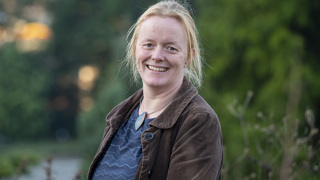The impetus behind the formation of the research group is the Dutch National Strategy on Spatial Planning and the Environment (Nationale Ogevingsvisie), which states that the Netherlands must be climate-robust by 2050. Climate change will increasingly cause water shortages and drought in the Netherlands. The risk of more frequent and intense rainfall will also increase. This extreme weather has a major impact on both agriculture and nature: it reduces yields for farmers, and damages nature.
Drought resilience measures
Government authorities are already taking measures to make the country more drought resilient in the future. For example, water boards are returning straightened streams to their original courses, so that the water remains in an area for longer and is available in drier periods. Groundwater levels will also be restored around nature wetlands. These measures will significantly increase the water content of soil in surrounding agricultural areas. This may make it desirable to change the way the land is used, so that it is more in harmony with the natural soil-water system.
Changing to other forms of agriculture
Restoring the natural soil-water system offers opportunities for other, non-intensive forms of agriculture that reflect the restoration of natural values. Connecting agriculture and nature can improve both biodiversity and water quality in an area. At the same time, it offers farmers a future perspective for plots that cannot be farmed profitably after the groundwater level has been raised. This means farmers and nature managers have to make a change. The focus of the research group is on is examining the knowledge and experience needed to realise this change.
Stream landscapes as experimental space
The practical research will initially take place in the stream landscapes of North Brabant. There are various ongoing developments in these landscapes, including the Van Gogh National Park and the Peelhorst en Maasvallei Geopark (both under construction). These areas have a broad focus, in which connecting nature and landscape is a top priority, combined with quality of life, involvement of citizens and business, and boosting the economy. For this reason, these areas provide a unique space for experimentation, where HAS University of Applied Sciences already has several separate projects underway. The research group of HAS University of Applied Sciences and the Netherlands Institute of Ecology (NIOO-KNAW) can provide this research with more structure, and enhance the results.
Connecting science and practice
According to NIOO-KNAW, the added value of this cooperation lies in connecting scientific and practical research. This means knowledge questions from the daily practice of a whole range of social partners and education reach the scientists more quickly, while the institute guarantees scientific quality thanks to its expertise and research facilities. In the coming years, the lecturer will therefore develop fundamental knowledge and predictive models together with other researchers.
Ellen Weerman’s CV
Ellen Weerman has over 15 years of experience in research, and nine years of experience in higher education. She studied Aquatic Ecology at Wageningen University, and obtained her PhD in 2011 at NIOO-KNAW and Radboud University for research into predicting the resilience and stability of ecosystems based on spatial patterns of algae. Over the past three years, Ellen has concentrated her research on climate-robust agriculture, including various projects implemented under the auspices of the 'Innovative Entrepreneurship in Rural Areas' research group.
Grant scheme
The research group ‘Climate-robust landscapes: connecting agriculture and nature’ is partly financed by the grant scheme L.INT Lecturer positions at Institutes of the Taskforce for Applied Research SIA, (Regieorgaan SIA) and the Dutch Ministry of Agriculture, Nature and Food Quality. Under this scheme, a lecturer can work at both a university of applied sciences and a research institute. This allows the lecturer to link the fundamental research of the institute with the practice-oriented research of the university of applied sciences. The research group will work closely with the research group 'Earning capacity of nature-inclusive agriculture', which focuses on earning models for business.
Photo: Lecturer Ellen Weerman








